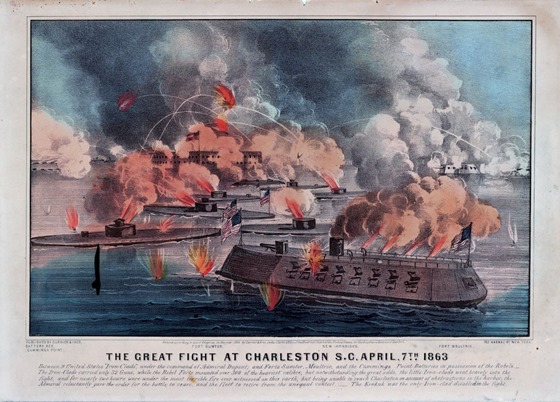by John Beauchamp Jones
APRIL 7TH. —Nothing definite has transpired at Charleston, or if so, we have not received information of it yet.
From the West, we have accounts, from Northern papers, of the failure of the Yankee Yazoo expedition. That must have its effect.
Judge Campbell, Assistant Secretary of War, has decided in one instance (page 125, E. B. Conscript Bureau), that a paroled political prisoner, returning to the South, is not subject to conscription. This is in violation of an act of Congress, and general orders. It appears that grave judges are not all inflexibly just, and immaculately legal in their decisions. Col. Lay ordered the commandant of conscripts (Col. Shields) to give the man a protection, without any reason therefor.
It is now said large depots of provisions are being formed on the Rappahannock. This does not look like an indication of a retrograde movement on the part of Gen. Lee. Perhaps he will advance.
This afternoon dispatches were received from Charleston. Notwithstanding all the rumors relative to the hostile fleet being elsewhere, it is now certain that all the monitors, iron-clads, and transports have succeeded in passing the bar, and at the last accounts were in readiness to begin the attack. And Beauregard was prepared to receive it. To-morrow we shall have exciting intelligence. If we are to believe what we hear from South Carolinians, recently from Charleston (I do believe it), Charleston will not be taken. If the ground be taken, it will not be Charleston. If the forts fall, and our two rams be taken or destroyed, the defenders will still resist. Rifle-pits have been dug in the streets; and if driven from these, there are batteries beyond to sweep the streets, thus involving the enemy and the city in one common ruin.
April 7.—Fort Sumter, in Charleston harbor, S. C., was this day attacked by a fleet of ironclad monitors and gunboats, under the command of Admiral Du Pont; but after a terrific bombardment of two hours’ duration, they withdrew from the contest discomfited.—(Doc. 158.)
—The United States gunboat Barataria was lost while making a reconnoissance in Amite River, La.—A successful expedition into Gloucester County, Va., to capture and destroy cattle and grain belonging to the rebels, was made by Colonel A. H. Grimshaw, of the Fourth Delaware infantry. He succeeded in destroying over ten thousand dollars’ worth of property that had been collected for the use of the rebels, and in capturing over three hundred cattle, sheep, etc.—Philadelphia Inquirer.

The great fight at Charleston S.C. April, 7th 1863: between 9 United States “Iron-Clads,” under the command of Admiral DuPont; and Forts Sumter, Moultrie, and the Cummings Point Batteries in possession of the Rebels. The Iron-Clads carried only 32 guns, while the Rebel Forts mounted over 300 of the heaviest calibre, but notwithstanding the great odds, the little Iron-clads went bravely into the fight, and for nearly two hours were under the most terrible fire ever witnessed on this earth, but being unable to reach Charleston on account of obstructions in the harbor, the Admiral reluctantly gave the order for the battle to cease, and the fleet to retire from the unequal contest. – The Keokuk was the only Iron-clad disabled in the fight.
Currier & Ives.
Library of Congress image.
___________
Fight at Charleston products from Exit78 at zazzle.com
April 7. —We all started out this morning, except Perkins, to see the review, by the President, of the army. On arriving at headquarters, we found that the review was postponed on account of the mud. Day pleasant.





